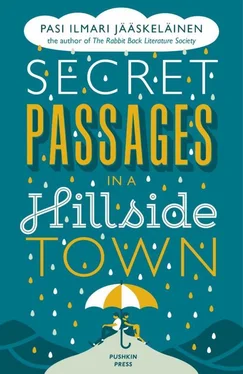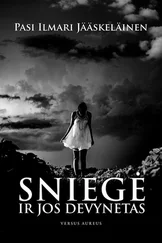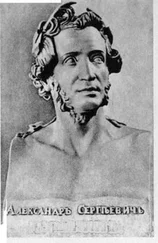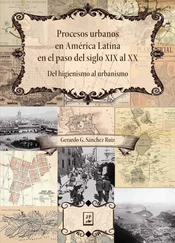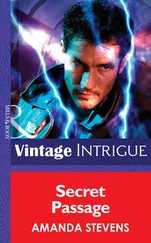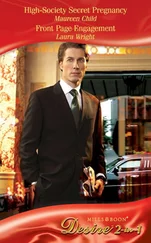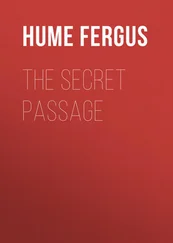“Fiddle-dee-dee,” she answers cheekily. “That’s a quote from Scarlett O’Hara.”
They look at each other. Olli’s suppressed smile escapes and spreads to Greta, and it’s very becoming on her.
They chat.
Greta talks about her happy life in Paris and the intoxication that came with the success of A Guide to the Cinematic Life . Her anecdotes reflect the charm, sharp wit and sensibility of their teller, her sometimes almost naive quality.
Olli talks of his own life in a vague way, avoiding any mention of his wife or son. When the conversation drifts too near to his family, Greta becomes uncomfortable and her face turns sad. Then Olli changes the subject and they settle on pondering life, art and other safe, abstract matters, but soon slip into talking about their own lives again when a good story or incident comes to mind.
The whole while they are both pretending. Greta pretends that Olli doesn’t have a family waiting for him in Mäki-Matti. And Olli acts the part of a man whose family is indeed waiting for him at home, as they are both aware, but pretends that they aren’t, for reasons of convenience.
In spite of the difficulties this entails, the conversation progresses like a spring brook, branching and meandering in its search for a route, but never stopping.
Olli almost succeeds in forgetting that he’s there as a victim of extortion. He allows himself to enjoy the conversation, and at the same time a part of him remains an observer, assessing the developing situation relative to his objective.
You and Greta had a beautiful love story; we understand that now. It’s time your story had a beautiful ending.
A beautiful ending. But what sort? An ending like the one in Emma Bunny? “ Do you like me? I like you. When we grow up, we can get married and have children together .”
One thing Olli knows is that these meetings are just the beginning of the beautiful ending that Anne is demanding. Today they have orders to walk hand in hand and share a kiss. Next time they’ll have to go further. The Blomrooses have decided to sacrifice Olli’s marital fidelity and give Greta the gift of his love in compensation for the crime they committed as children.
Olli smiles at Greta’s remarks, answers with his own, and tries to keep the conversation light, and his own grim thoughts hidden. It apparently isn’t working because Greta reaches out and touches Olli’s brow with the back of her hand.
“Do you feel all right? You don’t seem to have a fever, at least. You look quite pale.”
Olli remembers something he read in A Guide to the Cinematic Life :
A person’s life doesn’t consist of just one story but of many, some of them consecutive and others overlapping. While one story is a comedy, another may be a melodrama, or a thriller. It’s important to recognize every incipient story’s genre and let the deep cinematic self develop the right state of mind to supersede the slow continuum.
The holy cinematic trinity is beauty, hope and pain. A beautiful story has a beautiful beginning and a beautiful ending. The illusion of happiness makes the beginning beautiful, but the ending draws its beauty from pain.
In order to live with cinematic depth, you must surrender completely to the story that has become true at a given moment, even if it demands morally dubious behaviour or, as some would call it, sinfulness. Morality is one of the lower orders of aesthetics, and is ultimately subordinate to beauty. Morality changes—today’s sin is tomorrow’s beautiful dream—but the aesthetic is eternal. Even cruelty, betrayal and ruthlessness can, in some situations, be aesthetically justified and even unavoidable choices, and categorically avoiding them can lead to slow continuum attachment and the death of life feeling.
Olli touches Greta’s face and whispers, “I’m sorry. I’m just a little sleepy.”
Greta answers, “Don’t. Love means never having to say you’re sorry.”
Love . The word, carelessly tossed off, startles both of them.
Olli knows the quote. It’s from Love Story . Some love story this is. He almost breaks character, but manages to pull himself together, nods with soldierly charm and genuinely believes in M-particles when a fitting line from Sergeant Bruce, in W.S. Van Dyke’s Rose Marie , comes instantly to mind: “Well in that case… Your dream prince, reporting for duty!”
They get up and continue talking as they walk through town, listening to each other’s voices, but not the words themselves. Their thoughts are trapped behind their words, and the unspoken seeps through between their sentences.
When they come to the compass embedded in the pavement at Compass Square, Olli’s fingers feel their way down her arm and their hands join, as his instructions directed. It’s pleasant walking down the warm street. Olli’s step is light, and Greta moves with him, as sweetly as a dream, more gliding than walking.
The streets are full of racing fans, and of course people he knows from the parish council and publishing circles also walk past. Some of them slow down and turn to look at him. But Olli doesn’t look at them. He gazes into the distance, smiling fixedly and squeezing Greta’s hand so that he won’t lose his hold from sheer weakness. This is no time to wonder what people are thinking when they see publisher and parish-council member Olli Suominen out and about with a pretty, golden-haired woman who is clearly not his wife. His wife, after all, is the one who could suffer if he started to hesitate or lose his nerve, and he wishes he could yell this at acquaintances who stare at him, overcome with righteous shock, but of course that, too, could cause Aino to come to harm. So he will just have to worry about his reputation later, if he’s able to fix things such that it even matters.
Olli doesn’t venture to look Greta in the eye until they reach Are Square, which is packed with people.
They’ve all come to look at the eighth wonder of the world, brought to town for the occasion: a rally car on a stage with a famous French driver sitting in it. Children peep at the car and the man from atop their daddies’ shoulders; adults shove each other out of the way to get closer. Only two of the people present aren’t looking at the car. They’re looking at each other.
Greta opens the green of her eyes at Olli. No games now. No teasing.
Just complete openness, which is at the same time a question that shows her own vulnerability.
Olli looks deep into her and thinks that it would be easy to allow himself to sink so deep into that green that he forgot everything else.
They have left many things unsaid, but at that moment they stand facing each other, their souls bared, intertwined, although their bodies are not touching. This moment in a crowd is more intimate than a physical touch or nakedness could ever be.
Then Greta remembers that she has an errand to take care of and Olli says that he should get back to the office.
Before they each go their own way, they exchange a kiss. The touch of their lips is quick and light, an airy goodbye between friends that attracts no attention from anyone around them.
Olli crammed himself into a cab that had just dropped a passenger off in front of the pharmacy, and gave the driver his home address. It sounded strange and unfamiliar as he said it. He repeated it to make sure he hadn’t got it wrong.
When he got home, he opened the refrigerator. He was looking for mineral water, but he got some juice instead. He felt like something sweet. The neighbours’ lawn mower was yelling outside. He felt like his blood pressure was rising. He took off some clothes, went to the sofa, shut his eyes and forced his body to relax.
Sleep came quickly.
Читать дальше
